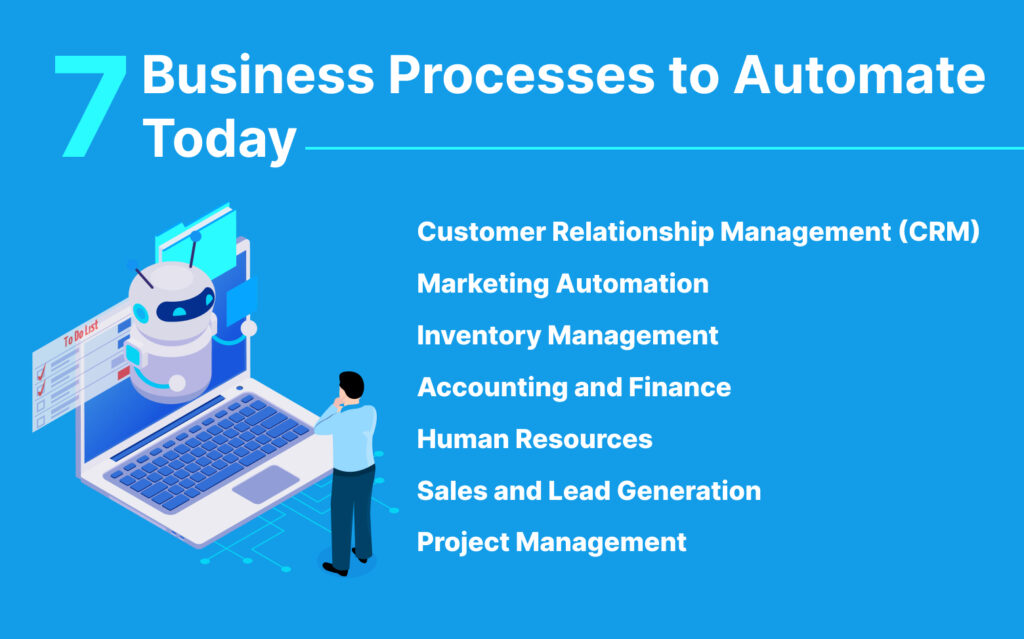
We can probably unanimously agree that we’d all prefer to have fewer tedious tasks on our plate. This is nearly universal across all mid-market companies.
In order to do that, we need to implement business process automation (BPA) measures, and that’s where things can get stickier. It’s harder to gain company-wide consensus on the implementation of BPA software that will require a budget, timeline, and training. Humans are somewhat hard-wired to resist change, and the thought of starting a project outside of your regular duties that might take weeks can be daunting.
But what if BPA didn’t take months? What if you could implement something in just a few weeks?
All of the sudden, that sounds pretty good! Automate a tedious task you dislike in only a day? Sign us up!
In this post, we’ll cover seven different business processes that are ripe for automation that carry extremely short implementation timelines. Who knows, perhaps streamlining one process will snowball into a company-wide digital transformation…
What is Business Process Automation and Why Should You Care?
Business process automation (BPA) refers to the use of technology to automate and streamline a company’s core business processes. It involves the use of software applications, robots, and other digital tools to perform repetitive, routine, and time-consuming tasks, such as data entry, document processing, customer service inquiries, and inventory management.
BPA can bring numerous benefits to businesses, including increased efficiency, productivity, accuracy, and cost savings. By automating manual tasks, companies can free up employees to focus on more strategic and value-added activities, improve process consistency and reduce the risk of errors, and achieve significant time and cost savings.
Moreover, BPA can help businesses stay competitive and adapt to changing market conditions. By automating key processes, companies can respond more quickly to customer needs, market trends, and regulatory requirements, and gain valuable insights into their operations.
In summary, BPA can be a valuable tool for businesses of all sizes and industries looking to improve their operational efficiency, reduce costs, and stay ahead of the competition.
Business Processes You Can Automate Today

- Customer Relationship Management (CRM) – Automating CRM processes can help businesses manage customer interactions and data more efficiently. This can include automated responses to customer inquiries, lead tracking, and customer segmentation.
- Marketing Automation – Automating marketing processes can help businesses streamline their marketing efforts, such as email campaigns, social media management, and content creation. This can save time and resources, while also improving customer engagement.
- Inventory Management – Automating inventory management can help businesses track and manage inventory levels in real-time, reducing the risk of stockouts and overstocking. This can help businesses optimize their supply chain and improve overall efficiency.
- Accounting and Finance – Automating accounting and finance processes can help businesses improve accuracy, speed, and efficiency. This can include automating invoicing, expense tracking, and financial reporting.
- Human Resources – Automating HR processes can help businesses manage employee data, recruitment, and payroll more efficiently. This can include automating employee onboarding, time tracking, and performance evaluations.
- Sales and Lead Generation – Automating sales and lead generation processes can help businesses identify and nurture leads, while also increasing sales productivity. This can include automated lead scoring, follow-up emails, and sales reporting.
- Project Management – Automating project management processes can help businesses manage projects more efficiently, including task assignment, progress tracking, and reporting. This can help businesses improve collaboration and productivity.

BPA isn’t about removing the human element from your business, it’s about enhancing it.
When done correctly, BPA is more of a partnership. The machines get to do what they’re great at, freeing up your employees to use their talents to innovate in other areas of the business.
One of the common misconceptions of BPA is that it takes months to implement. We hope that if you’ve made it this far, you can see that there are plenty of processes ripe for automation that have implementation timelines of a single day.
This includes the work we do at TEMPO—our business automation solution can be set up as soon as a couple of weeks. If you’re curious about what this might look like in your department, feel free to get in touch with one of our team members today.


